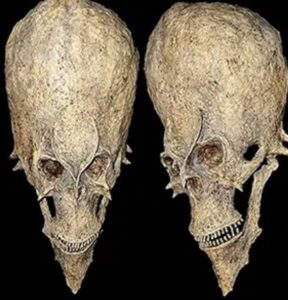For centuries, the prevailing belief has been that humans are the sole inhabitants of our planet’s rich history. However, a recent revelation from Africa has raised profound questions, casting a shadow of doubt over this conventional wisdom.
The discovery in question is a peculiar, mysterious skull found in Africa. Its physiognomy and bone structure bear an uncanny resemblance to that of a human. Yet, it boasts distinct features that defy classification within the human lineage.
Unsurprisingly, this enigmatic find has ignited intense debate, fueling a multitude of theories and conjectures. Among these speculations, one prevailing notion is that the skull could be an elaborate hoax, with its characteristics artfully manipulated.
Revisiting Our Past with a Strange Discovery
But, for a moment, let’s assume the authenticity of this extraordinary specimen, a mysterious skull. If validated, it would potentially upend our understanding of human history. Dating back an astonishing 14 million years, the skull carries another captivating feature: a notable concentration of iridium, a material often associated with meteorites.
Now, this astonishing revelation prompts a flurry of intriguing questions. Could it be connected to the mysterious mummies found in the distant lands of Peru, unveiling a connection that transcends continents and centuries? Or, perhaps, does it provide compelling evidence of extraterrestrial involvement in Earth’s history?

The possibilities are as expansive as the universe itself. While the debate rages on and the scientific community delves deeper into the enigma, one thing remains certain – this strange alien skull has introduced a captivating narrative that challenges the very essence of our established human history. In the evolving story of our existence, mysteries such as this propel us to reevaluate our past and broaden the horizons of human understanding. In the face of such profound mysteries, we find ourselves at the precipice of discovery, poised to unearth new chapters in our complex history.






